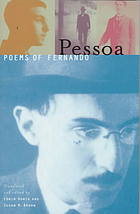Fernando Pessoa is Portugalʹs most important contemporary poet. He wrote under several identities, which he called heteronyms: Albet Caeiro, Alvaro de Campos, Ricardo Reis, and Bernardo Soares. He wrote fine poetry under his own name as well, and each of his "voices" is completely different in subject, temperament, and style. This volume brings back into print the comprehensive collection of his work published by Ecco Press in 1986.
During World War I, Pessoa wrote to a number of British publishers, namely Constable & Co. Ltd., currently Constable & Robinson, in order to print his collection of English verse The Mad Fiddler (unpublished during his lifetime), but it was refused. However, in 1920, the prestigious literary journal Athenaeum included one of those poems.[38] Since the British publication failed, in 1918 Pessoa published in Lisbon two slim volumes of English verse: Antinous[39] and 35 Sonnets,[40] received by the British literary press without enthusiasm.[41] Along with some friends, he founded another publishing house, Olisipo, which published in 1921 a further two English poetry volumes: English Poems I–II and English Poems III by Fernando Pessoa. In his publishing house, Olisipo, Pessoa issued also some books by his friends: A Invenção do Dia Claro (The invention of the clear day) by José de Almada Negreiros, Canções (Songs) by António Botto, and Sodoma Divinizada (Divinized Sodome) by Raul Leal (Henoch).[42] Olisipo closed down in 1923, following the scandal known as "Literatura de Sodoma" (Literature of Sodome), which Pessoa started with his paper "António Botto e o Ideal Estético em Portugal" (António Botto and the aesthetical ideal in Portugal), published in the journal Contemporanea.[43]
After his death in Libson in 1935, a trunk was found containing over 25,000 items - among them were collections of poems, letters and journals.
